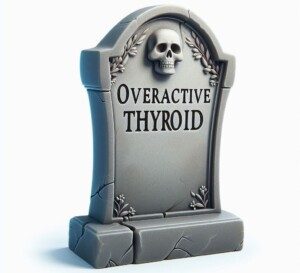Not having your overactive thyroid treated can kill you.
In fact, it’s not if, but when you’ll die if you don’t get treatment for hyperthyroidism.
“Hyperthyroidism is a condition in which the thyroid produces too much of the hormone thyroxine,” says Marcelle Pick, MSN, OB/GYN, NP, in private practice and cofounder of Women to Women Health Center, and author of the book, “Is It Me or My Hormones?”
Doctors often refer to the thyroid as the master gland. Certainly, it’s not hard to believe that neglecting to treat thyroid disease can have fatal consequences.
Overactive Thyroid
“The symptoms that someone can have are rapid heart (tachycardia), weight loss, irregular heart rate and pounding of the heart, anxiety, nervousness, change in menstrual cycle, change in bowels, skin thinning, fine brittle hair, sweating to name a few,” says Pick.
“Because it can have such significant effects on the heart, it is best to treat the condition as soon as it is diagnosed.
“Having significant cardiac reactions can impact the heart, which is different than hypothyroidism when the thyroid is producing less thyroid hormone.
“Some people choose not to treat their hyperthyroidism for a few years, and have heart-racing which ultimately can create significant health issues. The reality is that this condition untreated can lead to death.”
Deadly Storm
Why wouldn’t someone want their hyperthyroidism to be treated? Who knows, but maybe for some of these individuals, the weight loss – despite not eating less – is appealing.
What they don’t realize is that untreated overactive thyroid can lead to what’s known as a thyroid storm.
This is when the master gland pumps out a lot of thyroxine over a short period of time.
Symptoms include vomiting, diarrhea, confusion, sleepiness, high fever and shortness of breath. The condition can cause heart failure or coma leading to death.
But how long would it take before untreated overactive thyroid would lead to death?
There is no cookie cutter answer. The deadly storm could be triggered, in an untreated individual, by an infection, emotional stress, iodine from a CT scan, surgery or for no known reason.
The condition is a medical emergency and requires immediate intervention.











































